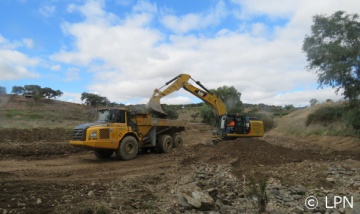Case study:LIFE Saramugo
This case study is pending approval by a RiverWiki administrator.
Project overview
| Status | In progress |
|---|---|
| Project web site | http://lifesaramugo.lpn.pt/en/life-saramugo-conclui-mais-uma-acao-de-reabilitacao-fluvial |
| Themes | Habitat and biodiversity |
| Country | Portugal |
| Main contact forename | Sonia |
| Main contact surname | Fragoso |
| Main contact user ID | |
| Contact organisation | Liga para a Protecção da Natureza – LPN (Nature Protection League) |
| Contact organisation web site | http://www.lpn.pt |
| Partner organisations | |
| Parent multi-site project | |
| This is a parent project encompassing the following projects |
No |
Project summary
The European Commission has approved the LIFE+ Project “Conservation of the Saramugo (Anaecypris hispanica) in the Guadiana basin (Portugal)” (LIFE13 NAT/PT/000786), whose acronym is LIFE Saramugo, coordinated by the Liga para a Protecção da Natureza (LPN) in partnership with public and private institutions, namely the Universidade de Évora (UÉvora), the Instituto para a Conservação da Natureza e Florestas (ICNF) and the company Aqualogus – Engenharia e Ambiente, Lda.
The main aim of the project is the enhancement of the saramugo’s populations by improving their habitat especially in three sub-basins of the Guadiana river (Xévora, Ardila and Vascão) located in 3 different Sites of Community Importance (SCI) of the European Natura 2000 Network (namely Guadiana, Moura/Barrancos and São Mamede).
The LIFE Saramugo Project focuses the reduction of the negative effects of the major threats to the survival of this small Iberian fish (namely of the degradation of water quality and riparian habitats, the invasion by non-native species and extreme climate events) and raising awareness and environmental education are also some of the project’s priorities.
To improve habitat suitability, in order to promote the species abundance and its expansion, the project develops different types of hydromorphological river requalification interventions, such as silt removal (especially in “pools” areas), recovery of the riparian vegetation through planting and / or cuttings, and rehabilitation of slopes with consequent improvement of the riparian curtain. For this purpose natural engineering techniques were applied, such as Salix wattle fences, vegetated crib walls and live single slope gratings.
Monitoring surveys and results
Lessons learnt
Image gallery
|
Catchment and subcatchmentSelect a catchment/subcatchment
Catchment
Subcatchment
Other case studies in this subcatchment: River restoration in the irrigation area Lobón (Badajoz), VALAGUA (Valorização ambiental e gestão integrada da água e dos habitats no Baixo Guadiana transfronteiriço)
Site
Project background
Cost for project phases
Reasons for river restoration
Measures
MonitoringHydromorphological quality elements
Biological quality elements
Physico-chemical quality elements
Any other monitoring, e.g. social, economic
Monitoring documents
Additional documents and videos
Additional links and references
Supplementary InformationEdit Supplementary Information
| ||||||||||||||||||||||||||||||||||||||||||||||||||||||||||||||||||||||||||||||||||||||||||||||||||||||||||||||||||||||||||||||||||||||||||||||||||||||||||||||||||||||||||||||||||||||||||||||||||||||||


